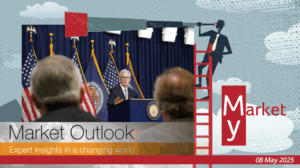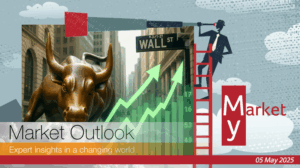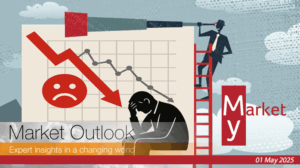
U.S. stocks experienced significant losses as market sentiment soured following President Trump’s announcement of new tariffs, setting off a chain reaction across global markets. On April 3, 2025, after regular trading hours, Trump revealed a 10% baseline tariff on all U.S. imports, effective April 5, 2025.
However, the most alarming news came with China’s retaliatory move, announcing a sweeping 34% tariff on U.S. goods. This escalation in the trade war sparked fears of a full-blown economic conflict, sending shockwaves through international markets, with particularly severe reactions from Asian stock indices.

Source: Newsweek
Market Panic Deepens as U.S.-China Tariff War Escalates
The new tariff measures are the latest escalation in an ongoing trade dispute between the U.S. and China. China responded promptly, announcing 34% tariffs on U.S. imports, which amplified investor fears of an impending recession. As a result, the S&P 500 index lost $5 trillion in market value over just two days, marking the steepest decline since March 2020, when the pandemic triggered a market sell-off.

Source: Al Arabiya
The market’s reaction was swift, with major U.S. stock-index futures falling by over 2.5% in after-hours trading. Asian markets were hit hard, particularly Japan and South Korea, where electronics and automotive sectors, heavily reliant on global supply chains, saw steep declines. U.S. companies such as Apple, Amazon, and Nike experienced significant post-market losses as investors grappled with the potential disruption of their global operations.
Tech Stocks Tumble as S&P 500 and Nasdaq Enter Sharp Correction
The S&P 500 index faced a 5.97% drop, closing at 5,074.08. The Nasdaq Composite confirmed a bear market, falling by 5.82%, while the Dow Jones Industrial Average slid by 5.50%, marking a correction from its previous record high. The technology sector, particularly companies with substantial exposure to China, suffered significant losses. Apple’s stock dropped 7.3%, while semiconductor stocks, which are deeply integrated with Chinese manufacturing, also experienced sharp declines.

Source: Market Watch
Oil Dives, Gold Climbs Amid Recession Fears
Oil prices plunged by around 7%, reflecting fears of a global recession, as China is the world’s largest oil importer. U.S. crude futures fell to $61.99 per barrel, while Brent crude dropped to $65.58. Meanwhile, gold futures gained 1.45%, closing at $3,191.75 per troy ounce, as investors sought safe-haven assets amidst market volatility.

Source: Money Talk
In the currency markets, the U.S. dollar showed mixed performance. Against the euro, the dollar lost 0.69%, while it strengthened by 0.58% against the Japanese yen.
Powell Warns of Tariff Fallout as Recession Odds Climb to 60%
The tariff measures raised concerns about the broader economic impact, especially in terms of inflation and slowed growth. Federal Reserve Chairman Jerome Powell indicated that the tariffs were “larger than expected,” with the potential to spur higher inflation and slower economic expansion. Powell’s comments underscored the uncertainty surrounding future monetary policy, as markets anticipate the potential for rate cuts in response to economic pressures.

In a notable shift, investment bank JPMorgan has raised its recession forecast, now predicting a 60% chance of the global economy slipping into a recession by year-end.
Tariffs Shake Global Outlook, Fed in Focus
The market’s reaction to these developments highlights growing concerns about the stability of global supply chains and the broader economic repercussions of sustained tariff wars. Countries such as Canada, the European Union, and Japan are poised to retaliate, adding to already elevated market volatility. In Europe, the EU has prepared responses, including a proposed 20% tariff on U.S. goods, with French officials suggesting businesses freeze investments in the U.S.
While some analysts believe these disruptions could eventually lead to a recalibration of global trade dynamics, the short-term costs are expected to be significant. As the situation evolves, the near-term market outlook remains cautious. Uncertainty surrounding the tariff war, coupled with volatile economic indicators, is likely to keep investors on edge.

Source: The New York Times
The broader sentiment continues to be influenced by fears of a prolonged trade conflict, with global markets bracing for further impacts. For U.S. stocks, the immediate future appears challenging, but there is potential for recovery once markets adjust to the new trade reality. The Federal Reserve’s stance on monetary policy, along with the global response to these tariffs, will be key in determining how quickly market confidence can be restored.
CONCLUSION
- The U.S. stock market is suffering due to escalating trade tensions, worsened by China’s 34% tariff retaliation.
- The S&P 500, Nasdaq, and Dow Jones have experienced significant losses, with the tech sector particularly affected.
- Global markets, especially in Asia, have also been severely impacted by the tariff measures.
- The tariffs are expected to drive inflation higher and hinder economic growth, fueling fears of a global recession.
- Investor confidence is fragile, with increased market uncertainty and a cautious outlook ahead.
- The immediate future remains challenging, with market recovery hinging on the responses from U.S. and global policymakers.
- As the full impact of these tariffs becomes clearer, stabilization will depend on careful adjustments to the evolving global economic landscape.
Please note that all information in this newsletter is for illustration and educational purposes only. It does not constitute financial advice or a recommendation to buy or sell any investment products or services.
About the Author

Rein Chua is the co-founder and Head of Training at AlgoMerchant. He has over 15 years of experience in cross-asset trading, portfolio management, and entrepreneurship. Major media outlets like Business Times, Yahoo News, and TechInAsia have featured him. Rein has spoken at financial institutions such as SGX, IDX, and ShareInvestor, sharing insights on the future of investing influenced by Artificial Intelligence and finance. He also founded the InvestPro Channel to educate traders and investors.
Rein Chua
Quant Trader, Investor, Financial Analyst, Vlogger, & Writer.




